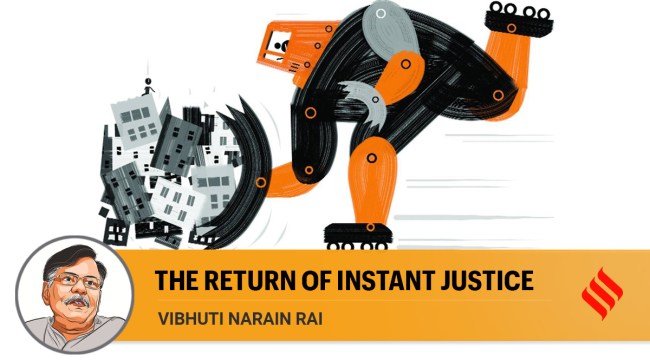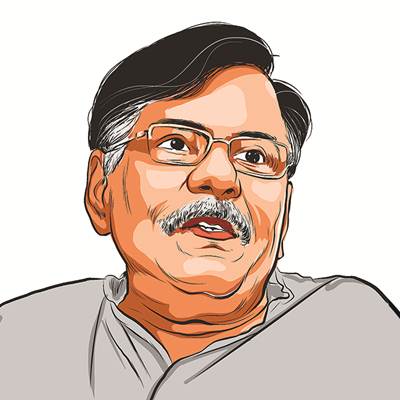Opinion Instant justice is not the way of a civilised society
V N Rai writes: The tendency of law enforcement agencies to pronounce verdicts and dispense punishment, without going through due process, signals a setback to the quest for a more humane justice system.
 Civilised societies have also recognised the rights of the accused as part of natural justice. (Illustration by C R Sasikumar)
Civilised societies have also recognised the rights of the accused as part of natural justice. (Illustration by C R Sasikumar) In Fyodor Dostoevsky’s all-time great novel Crime and Punishment, the hero Rodion Raskolnikov initiates a classical discourse on the sociology of crime and the rationale of society punishing the “criminal”. It was a common belief till the second half of the 19th century, when this immortal character was created, that a criminal is a cursed creature who deserves exemplary punishment, that too publicly.
Justice was often instant with very few rights available to the person facing the “judge”. In many cases, a person declared guilty was stoned, beheaded or hanged to death in full public view.
The changing face of the criminal, crime and punishment offers fascinating insights into the changing value systems of society. Acts considered criminal a few hundred years ago do not attract punishment today. Most societies don’t punish extramarital relationships and LGBT people are not seen as deviants. Similarly, the rights of a person charged to defend himself reasonably have been recognised as part of natural justice. It is like the journey of a state towards civilisation. A more civilised society means more compassion towards a delinquent. The purpose of punishment changes from the destruction of the soul and body of a recalcitrant to facilitating him to become an integral part of the nation. Nation-states that top the human development ladder have abolished capital punishment. In India, the courts award such punishment in the rarest of the rare circumstances.
Civilised societies have also recognised the rights of the accused as part of natural justice. Instant justice has become a thing of the past and an accused is provided a lawyer, his right to appeal a sentence is honoured and a person is generally considered innocent until proved otherwise. The sudden appearance of a bulldozer denies a victim any opportunity to avail any of these — vakil, dalil and appeal. He is simply condemned to watch an arrogant bureaucracy demolish his property helplessly.
In independent India, which is trying to modernise very fast, instant justice has been abolished from the books but is deeply entrenched in the psyche of the people. Ram Manohar Lohia, a dominant presence in the political discourses of this country till the late 1960s, described this tendency as “cruel cowardice”. He gave the example of the average Indian who dared not oppose the goonda of his locality but never missed the chance to give a blow to the pickpocket caught at a bus stop.
The Indian state displays this tendency at times, though not as brazenly as it has done of late. From my UP experience, I can admit that there was always a complicit state that looked the other way when a “dreaded outlaw” was gunned down by the police in an “encounter”, but such acts were rarely celebrated. Except for a brief period when V P Singh was the chief minister and the state publicly extolled encounters, which were mostly fake, governments are not known to acknowledge them openly. A state may take some corrective measures, though unwillingly, only when there is a public outcry or judicial intervention. It is after a long gap that important political and executive functionaries have started speaking publicly in favour of instant justice. The police have been given the role of investigator, judge and executioner and they are really enjoying it. In the last few years, hundreds of people who were yet to be declared guilty by a court of law were, reportedly, shot in their legs and maimed.
The most unfortunate part of the story is that a large number of people support this cruelty. A few years ago, youngsters who had sexually assaulted and murdered a doctor were taken out of jail and killed by the police in a manner which could have shaken the conscience of any civilised society. However, the people of Hyderabad celebrated this ghastly violation of the law. Perhaps the traditional attraction for instant justice discouraged citizens from asking questions about the inability of the justice dispensation system of the country to punish such heinous criminals in a short time frame. My memory of UP has numerous anecdotes of people coming out on the streets and celebrating the killing or maiming of a person by the police who otherwise could not be punished by a court of law. This shows both attraction towards instant justice and the acceptance of an outdated legal framework, not equipped to meet the challenges of modern-day life. The state also appears to be happy about this uncivil acceptance, as bringing fundamental changes in police procedures, prosecution and courts will involve expenditure, and instant justice is cheap. The time has come when the nation has to choose between an expensive civilised justice dispensation system or a brute tradition in which the police dons the cap of investigator, judge and hangman.
Recent instances of bulldozing residential or commercial dwellings of people who the rulers of the day think have committed unpardonable crimes have opened the Pandora’s box from where some very uncomfortable questions are emanating about the character of the Indian state. Instant justice makes an individual barbaric and similarly, instant justice makes a society barbaric. The bulldozer culture is turning the Indian state into an uncivilised and barbaric state. If this is not stopped immediately we will lose whatever little we have achieved through our wonderful Constitution in the last seven decades. Our journey to make our society democratic and amenable to the rule of law will turn into a nightmare.
This column first appeared in the print edition on April 29, 2022, under the title ‘The return of instant justice’. Rai, a retired IPS officer, is the author of Hashimpura 22 May, a chronicle of the 1987 custodial killings







